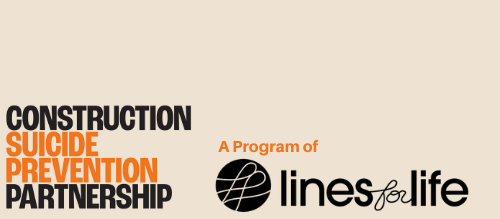No single reason explains why suicide occurs at a population or individual level. It is a complex issue. However, we know the construction industry has a suicide rate 3x the national average. The aspects of the industry that contribute to this high rate are called risk factors.
A key component of suicide prevention is reducing risk factors and educating the workforce on what they are. Effective suicide prevention also focuses on boosting protective factors. Protective factors foster resilience against risk factors, making it more likely a person can cope with life’s challenges. So, what are some of the suicide risk factors facing the construction industry, and how do we address them?
Finances
In the construction industry, work is often seasonal and sporadic. This can make it difficult for workers to budget for the slow times, especially if they are out of work without warning. Finances affect the worker and their family. The inability to financially support a family can make people feel like a burden on others, and debt can make someone feel trapped in an inescapable situation. Financial difficulties are a known risk factor for suicide.
Companies can help their employees navigate financial uncertainty by providing them with financial literacy education on budgeting and saving for when work does slow down. If your Employee Assistance Program offers financial counseling, be sure you communicate how to access those services. When you are in a position where employees are laid off, make sure they receive resources to support their financial and mental health needs. Check out our toolbox talk on financial wellness for more information.
Sleep
When someone isn’t getting enough sleep, almost every part of their health is negatively affected. Mental health is no exception. Construction workers usually have to wake up very early to get to work on time and work long days. For those with long commutes or changing work locations, this can reduce the amount of sleep they are able to get. Those who work nights actively work against their body’s circadian rhythm to sleep during the day! Lack of sleep can negatively affect those with mental illness and worsen anyone’s mood.
The construction industry can support workers in getting enough sleep. There are already efforts to increase daytime road construction. Share strategies to maximize the quality of sleep with your employees. Managers can play a role in supporting workers in getting enough sleep. Check out this training to learn more about the role of managers in this area. You can also look at our toolbox talk on sleep.
Stress and Pressure
Construction sites can be stressful places. The constant moving of materials, threats to safety, tight deadlines, and budgets increase the pressure everyone on the job site feels. Plus, we know that workers show up to work with all the other stresses from home. When someone feels overwhelmed and unable to handle the obstacles, thoughts of suicide can occur.
Workers must get tools to deal with stress and know where to turn to for help when their work or personal lives become overwhelming. Have a regular cadence to share messages about effective ways to handle stress and promote resources that connect to help. If there is a particularly stressful or intense part of a job, focus these communications on the teams working on those projects. Clear communication about what to do when a workload becomes too much can help workers prevent their stress from spiraling into a crisis.

The CSPP can provide you with materials and resources to ensure everyone on your site knows they can call the National Suicide Prevention Line (988) for support.
